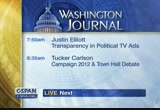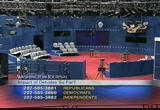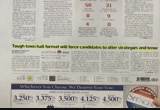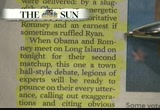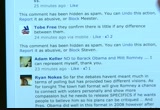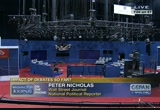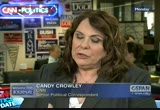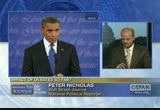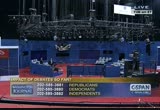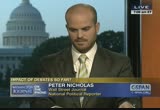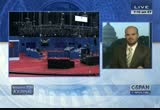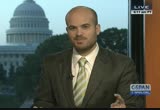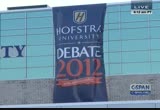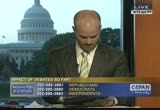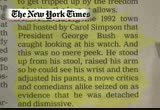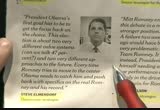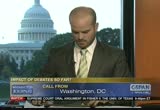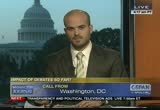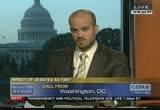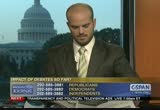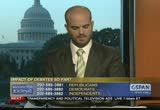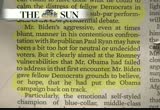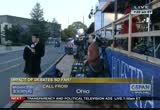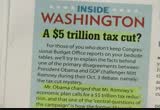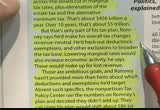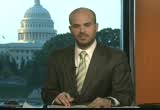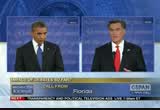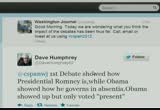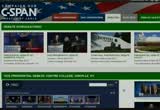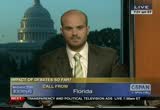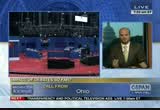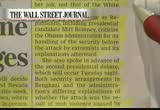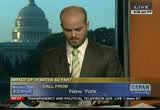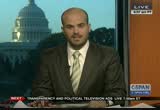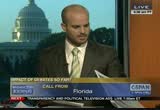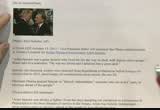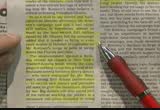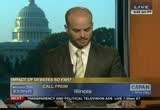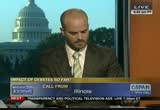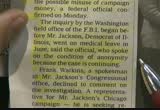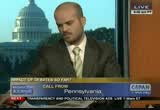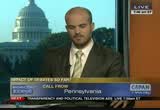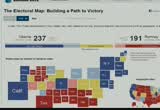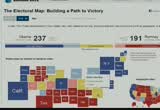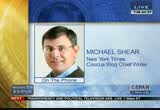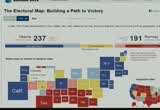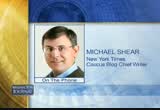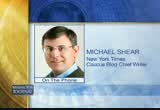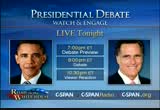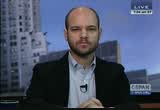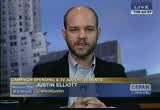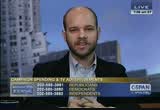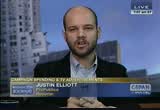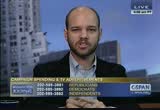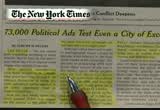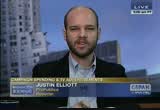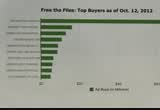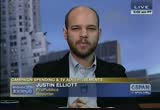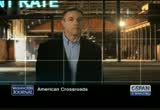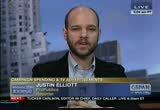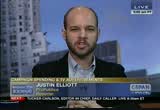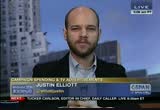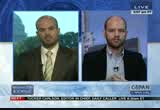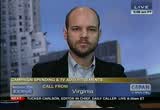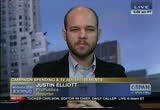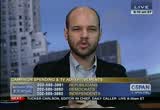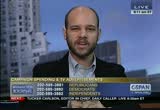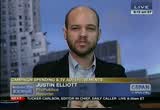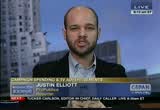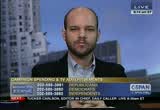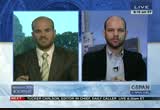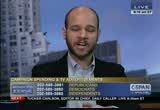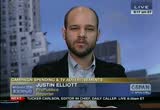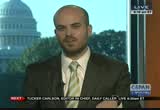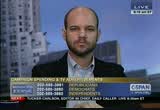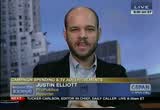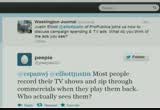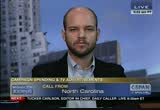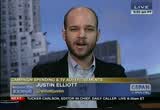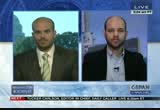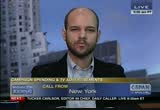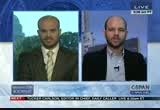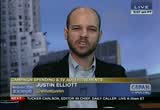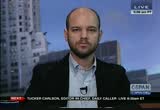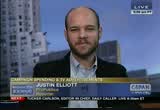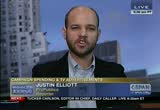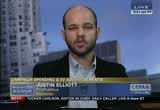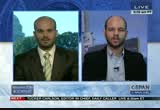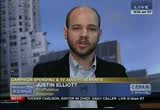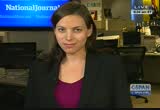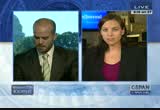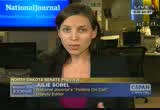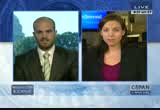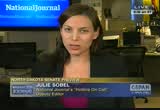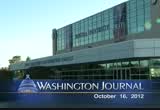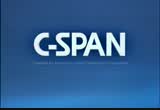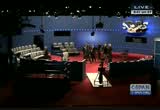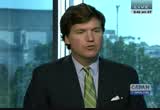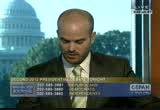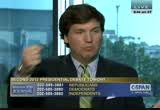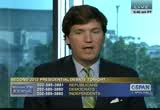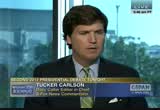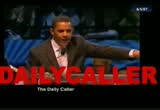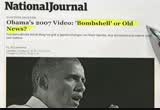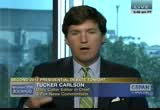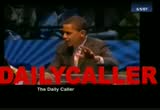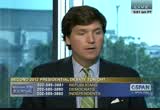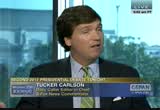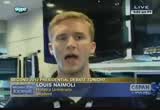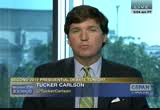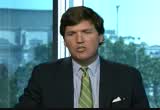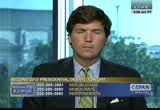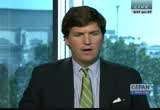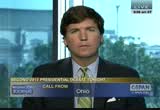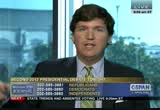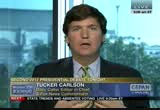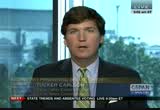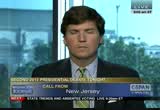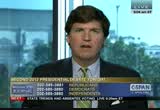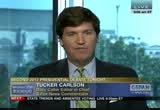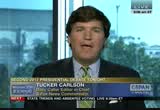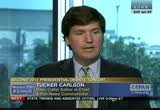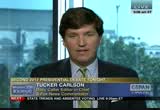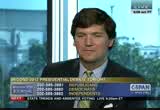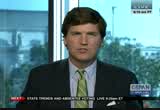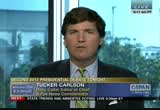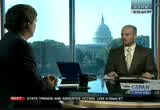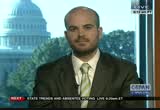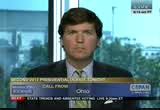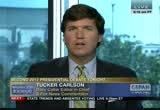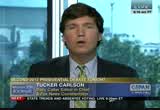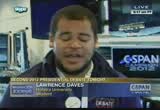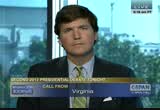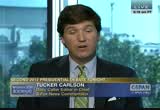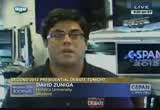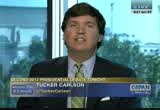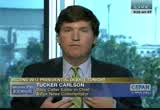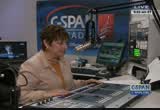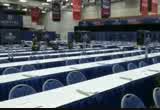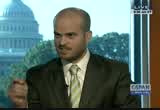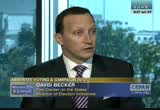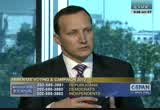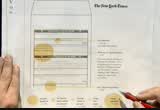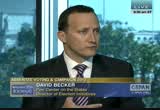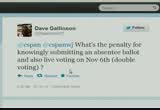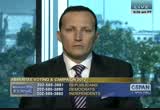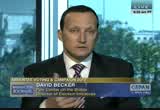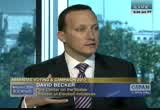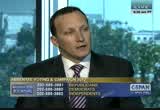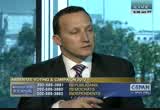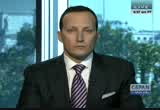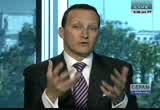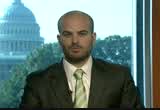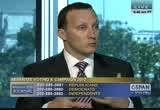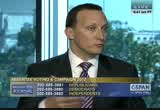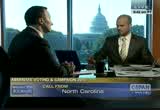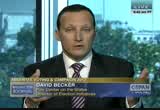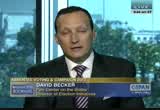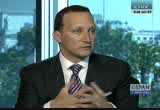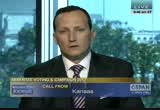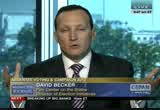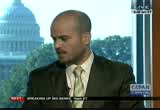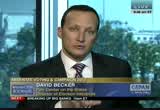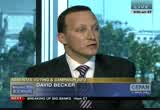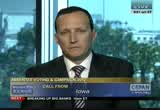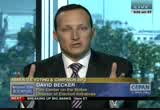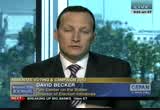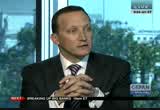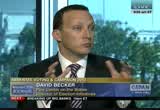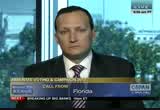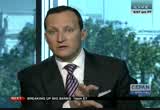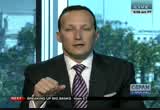tv Washington Journal CSPAN October 16, 2012 7:00am-10:00am EDT
7:00 am
of the latest developments in the presidential campaign. our guest is tucker carlson. we will hear from david beckert about the latest date trends and absentee voting. ♪ host: good morning, it is tuesday, october 16, 2012, debate day in the presidential race. tonight president barack obama will square off against republican mitt romney in a town hall style debate. right now you're looking at a live shot of the david mack conference center. as we preview the matchup tonight, we want to hear your thoughts on the impact of the debates so far.
7:01 am
have the debates influence your vote? give us a call. host: you can also catch up with us on facebook and twitter, where you can use our usual journal@c-span.org, twitter.com/c-spanwj, or our special town2012 hashtag, so they you can talk about the debate's all night. the richmond times dispatch headline, "obama romney set for round two." in "of the star-ledger," the headline is "tough town hall format will force candidates to
7:02 am
alter strategy and tender. in today's open "the washington post," obama's chance to connect on the stage. then there is "the chicago sun- times," saying to "for get tonight's debate, the real battle is in ohio -- forget tonight's debate, the real battle is in ohio." president barack obama, "misstating health care costs, joe biden mischaracterized the troops in afghanistan, but running --
7:03 am
7:04 am
host: we will be discussing that all morning. you can go ahead and start calling in right now. i want to point out that night you can also go to c-span.org /debates to check out our c-span online campaign 2012 debate held for lots of information about what is going on. want to bring you to "the wall street journal" reporter this morning, peter nichols, joining us to talk about the debate. thank you for joining us. >> good to be with you. host: explain how this town hall format will work to the folks. caller: uncommitted voters will be asking questions.
7:05 am
each candidate will get two minutes to answer the question. and then the moderator will have another two minutes to have a discussion based on the question of. both campaigns are used -- concerned that the moderator might use too much discretion, but the rules of the debate are that he will have to follow the original question. for example, if they ask about the deficit, the moderator cannot suddenly stepped in to talk about libya. uncommitted voters are people who are undecided or might be leaning towards one candidate or another, but open to changing their minds. they have been selected by the gallup organization. the idea is for the candidates to interact with real people and take questions from real people about their lives and concerns.
7:06 am
host: steve sculley sat down with the moderator to talk about the debate. want to play a bit of that now. [video clip] >> we have asked those folks to come with a few questions that they're interested in hearing the answers to, so that we can format that this is an interesting subject. it will be -- it will feel like and be a conversation, as opposed to here is a random question, random question, random question. it is about rolling one question into the next. we select and look at the question. in my mind i am thinking this candidate may go this way or that way, do we even need a
7:07 am
follow-up in winnowing down into these details? host: peter nichols to assess this morning from "the wall street journal." your headline is "town hall format could dull the barbs in second debate." explain that a little bit more for us. >> president obama needs to show some energy in this debate. it was lacking in his first debate in denver. his supporters are looking to see someone who is challenging mitt romney and showing some fight that we did not see before. quoting democratic officials from the mexico, she watched the debate with a sense of dismay and she worried about how she was going to talk about this debate to democrats and
7:08 am
independent voters that she needs to get out to the polls. he has to show that he is willing to take on mitt romney and defend his record, yet this town hall format is one where real people will be on stage and asking poignant and pointed questions about their own lives. it is a risk for the candidates to take these questions and just use them as an opportunity to attack each other. they want to come away feeling that the candidates have addressed this issue. that they do not feel like props. people are warning about that. from bill clinton told a group of donors in los angeles that it is not a format, which is one of the challenges that obama will face tonight.
7:09 am
7:10 am
the questions will probably reflect the real lives of people. the economic downturn has affected so many people and employment remains high. people are obviously worried about what is happening in libya and afghanistan. i think that we can expect questions drawn from the real- life experience of people. it will be a chance for both candidates to show that they can relate to the audience. it should not be a challenge for both of them. barack obama is perceived as somewhat distant and aloof in some respects, but so is mitt romney. it should be very different from what we saw in denver. host: peter nichols, thank you
7:11 am
so much for joining us this morning. again, that debate starts at 9:00 p.m. eastern time. we want to get your reaction as to how the debates have influenced your thoughts on the election so far. rocky mountain, n.c., democratic line. thank you for joining us. your thoughts on the debate so far? caller: i thought that the president was a bit lax, but effective in the debate. i have a quick one to ask the people. how can you fix the economy in four years when you have a bad outlook for 16 years? i mean, the president is just one man. you have got to have participants on both sides.
7:12 am
host: thank you so much for that this morning. republican line, orange, texas, bill is waiting to talk about the debate so far. has it impacted your decision on the vote? caller code the debate has not really impacted me at all. i have been rather frustrated, because for me is difficult to understand and comprehend the facts -- let me say that these men are very intelligent. more so than i will never be, no doubt in my mind. but to get up there and just act like kids, going back and forth at one another, i totally disagree with that kind of
7:13 am
conduct. i would like to see them get up there and do the best that they can to provide the facts and allow the other -- they do the same thing, without the mudslinging. that is what i have to say. host: comments coming in already from twitter. jason rights in -- host: another twitter message this morning from gary. host: we want to go to the independent line this morning. hope that i got that right. your thoughts on the debate so far?
7:14 am
caller: i do not consider these debates, they're more like a joint press conference. they are excluding gary johnson, the libertarian candidate, he would get some of the -- he would get them to talk about the true issues. issues that americans believe are important. host: thank you for calling in from pennsylvania this morning. we want to talk a little bit more about that less formal format. this is the headline from "the new york times," this morning. "less formal, but little less to -- left to chance."
7:15 am
7:16 am
7:17 am
the political politician stand. obama presented the facts and i felt good about those facts. he stated his case like a good lawyer. he did not go back and forth with mitt romney debating on issues that we already know about. this is old news. he did a very good job just stating his position to the people. and he gave the people a chance to respond at the polls on november 6. as far as the economy, i am a contractor in the washington, d.c. area and i am thriving. in the last four years, people are spending money quietly, which is not stated in the papers. from my point of view, i am very
7:18 am
satisfied with obama. he will get my vote again. host: do you think that these debates are actually changing people's opinions? here is an abc news poll that was put out yesterday by "the washington post." who would you vote for if the debate -- if the election were held today? the numbers did not really move before or after the debates. do you think that there is movement going on in the country? caller code there is movement going on, and there have been decided voters who already know who they are going to vote for. these polls targeting certain people, it is not targeting the whole general public. if it was, you would see obama being 75, romney being 25.
7:19 am
but these statements going up, these polls are not really fair in terms of giving a defense. they ask a few phone call questions, you answer yes or no, that goes toward to the candidate is. host: william, not trusting the pollsters out there. let's go to hutchinson, kansas. sharon, what do you think about these debates and whether they actually move people at the polls? caller: i am not sure. i wish that candy would ask about the reagan rule. reagan set the capital gains rate at 28% because he believed capital gains should not be taxed at those rates, which is outrageous, because mitt romney is using the carry interest
7:20 am
loophole. that is not capital gains. capital gains is for income over one year. would run the be willing to get rid of this carried interest rate will hold? it is not double tax, he has paid trip partnership and there is no corporate tax incurred. host: you are on the republican line. have you made up your mind? caller: probably. host: do you want to share? caller: i just do not see -- it is a split ticket -- i do not see where mitt romney has a definitive plan for the economy. to me it will be bush no. 2, with tax cut 2001, 2003, and then financial meltdown.
7:21 am
i do not think that to go back to the system will be productive. i would prefer the reagan rule, all alike as said, everyone is taxed at the same rate. i do not think they should be taxed at a lesser amount. host: thank you for calling in this morning. lots of commentary about what needs to be done. here is an article from a columnist and former longtime writer for "the baltimore sun." the book is "and joe biden sets the tone -- the article is "joe biden sets the tone."
7:22 am
7:23 am
some of them were overridden unanimously, some by republicans. he vetoed elevators for the handicapped, but not for his own cars and $12 million rises. he is on the board of a company that was fined $83 million for fleecing medicare. as the governor of massachusetts he outsourced to india, while as the ceo of bain, the outsourced to china and mexico. host: do you think that these said the issues that the moderator needs to select questions about tonight? caller: i do. he increased $2.6 billion, for that debate in massachusetts, making massachusetts the most indebted state per-capita. he had hundreds of millions of
7:24 am
dollars in new finds, including funds -- not a fine, but a charge -- sorry, i meant to say millions of dollars in new fees, including one for blindness, which had never been a charge before. host: we have been showing you live pictures of the sports exhibition complex where the debate is going to happen tonight. i should note that that is the same place where in 2008 president obama met john mccain in the third and final debate in that campaign. one of the issues expected to come up again tonight is the idea of a $5 million tax cut. it is something that president obama was pushing against mitt romney in their first debate.
7:27 am
host: a breakdown of those $5 trillion talking points. we will go to george, democratic line. have the debates influence your vote so far? caller: i have been a barrage obama supporter from the very start. i do not think that he lost the first debate. i do not think that mitt romney won either. like the previous caller said, the mitt romney previous record was not brought up. neither were the missing taxes, or the bay and layoffs. abortion did not come up. the war on women, birth control. the tax plan. these were all missing from that debate.
7:28 am
the president neglected to bring them up. he would have lessened those numbers that romney came off with. host: george, thank you. caller: hello? host: go ahead. caller: one more comment on the vice presidential debates, i think that joe biden clearly one. he never disrespected him. there was a little bit of laughter, but it reminds me of when i talked to my son. he was pinocchio when he was young. he laughed throughout the whole time. it reminded me about that. host: dave humphrey rights in that the first debate showed
7:29 am
how presidential that mitt romney is of governing in absentia. obama showed up but only voted present. also on twitter this morning -- host: so, as you are watching the debate tonight, we want to point you to the c-span debate hub that c-span will be running tonight. it will provide additional video, political information, social media opportunities. during all of the debates, it will feature people who love politics and are interested in the debates so that they can watch, discuss, connect, and share. among the features we have there, streaming coverage of the debates, sights and sounds
7:30 am
before, after, and during the debates, including the arrival and departure of debate audiences, as well as other activities around the site. you can use that hash tag to facilitate the community of viewers on twitter. we will also provide on that site easy access to the twitter messages from reporters. it is being used this morning already. this comes from twitter -- host: we will go to jenny, republican line, englewood, florida. once again we're showing the forum where the town hall debate will be taking place. host: -- caller: good morning.
7:31 am
we have a son named john in our family also. my comment is a bit different. i am hoping that the moderator controls the debate. not to be too critical, but the first moderator was excellent. he was excellent. the questions were asked and we got to hear the answers and he kept things rolling. the audience was well behaved. but the second one, in my opinion, did not do a very good job. there are too many important issues out there. i truly believe that there are still a lot of people who are undecided. we have the right to hear these questions and hear them answered. it is the job of the moderator to control the debate and do it properly. i think that the second one, the conduct was not controlled.
7:32 am
how do you feel about that? caller: there -- host: let me ask about tonight's moderator. there has been some push back from the campaign's about whether she should be able to go on about different subjects after the folks in the town hall ask their questions. what do you think that her role should be? caller: she should be the moderator. that is our role. she should not judge, she should ask the questions fairly, and she should vote her conscience and of know how her conduct is going to be. she should know that in her mind a lot of people are listening to every question and every answer and give both candidates the chance to answer them. control any snarls, smiles, any
7:33 am
misconduct. this is a debate. things are very important that will be said. people have the right -- there are tons of people watching this on television, people that cannot get out and get the paper or do not have a chance to go to these open forums in the different sounds. these debates are very important and the moderator is the one to control this tonight. very important, she should just be the moderator and ask those questions fairly. i do not know anything about the woman, but i am hoping and i will say a prayer that got director to be a good person tonight. -- god director to be a good person tonight. host: you are on "washington journal" this morning.
7:34 am
and out in [no audio] caller: there are people that are part of the 47%. there are so many poor people out here that do not have any health care, they do not even address it. they act like the middle-class is the only class of people in need to conform to and there are plenty of people out here hurting much worse than the middle-class. they seem to get no help at all. host: thank you for calling in from ohio. we want to show you a shot of the spin room at hofstra university. that is where the media and the political analysts on both sides will be meeting.
7:35 am
we want to point you to a few of the headlines this morning, for the first 45 minutes of the washington -- "washington journal," today. "united states secretary of state, hillary clinton, says she takes responsibility for the security at the diplomatic outpost in the gauzy, libya, where christopher stevens and three others died in the attacks last month. she said it is like a big family and that it is painful, absolutely painful. monday she also accepted the blame, adding that the security there is her job, not that of the white house. her comments come as mitt romney
7:36 am
criticized the obama administration for its handling of the security before the attack by extremists and the explanation afterwards. she also spoke in advance of the second presidential debate, which will occur tonight. we will see if mitt romney brings up that issue in tonight's debate. going back to the phones, julie is from "the bronx." how have the debates influenced your election? caller: thank you for taking my call. i just want to school people, whoever is listening, how should i say this? when they have obama leading by 49%? with mitt romney behind by 48%?
7:37 am
these polls, there are thousands of millions of people in the united states and these polls are taken only by 100 to 200 people. it does not represent everybody in the united states. obama did very well. i hope you understand that mitt romney lies and continues to live. when obama was leading, they were upset. now mitt romney, the people voting for him are happy. they say he is being disrespectful? they do not like it and they find something bad to say about it. the way that they characterize the obama, talking about him so bad, is very disrespectful. they always this respect the president and it has to stop. host: not trusting the polls out
7:38 am
there, julie. one of the biggest names in polling is gallup, the swing state poll is out on the front page of today's "usa today." host: that poll was in the field october 5 thru october 11. you can read more of those results in today's "usa today." for lauderdale, florida. tom, welcome to the "washington journal." caller: thank you for having me. i think that the debates are having a tremendous impact on the race, because president
7:39 am
obama does not do very well when someone asks him a legitimate question and has time to give him a follow-up. he does not have anything there. tonight i hope that one of the questions that people in the audience or candy asks is -- what is stopping you? you are president of the united states. if you had a way of bringing congress together, what is stopping you? your president of the united states. are you hoping it will be 100% democrat in both houses, so even cram what ever you want down the throat of everyone again? people call in and said that congress does not want to cooperate with barack obama. well, he had a great start, did he not? he crammed that the medical plan down the throats of republicans. that was a great way to go. my question for president obama
7:40 am
should be -- you are president of the united states. if something is going to be different in your second administration, what is stopping you? do it right now. walk out of this auditorium right now and go do it. or is it that you do not realize you are president of the united states? we need a leader. people are tired of waiting. waiting for a job, waiting for a raise, waiting for this country to be what it is supposed to be. it will not happen under this president. host: tom, thank you so much. i want to point out a story from yesterday, the announcement that joe biden will be attending and representing the obama administration at tuesday's state funeral for arlen specter. the great senator who lived his life the way that he died, with dignity and courage, according to joe biden in a statement.
7:41 am
he died sunday of complications from cancer. he was 82 years old. for more comments from twitter about the debates and more about what the moderator should be doing tonight, gary rights in -- host: and in other campaign news today, this from "the new york times." we will be talking about campaign ad spending in one of our later segments. the republican party is going to a late push to raise tens of millions of dollars in the last weeks of the election. the romney campaign said that it had raised $170 million in
7:42 am
september. but the campaign added that they needed to bring in even more money in october to capitalize on the mr. romney surge in the polls. there was a three day retreat for donors, where the campaign was seeking to tap into a burst of enthusiasm among formerly jitter -- jittery donors. chicago, ill., on the independent line. good morning to you. caller: bear with me. i always get nervous when i call in, but i wanted to make several points to respond to a caller a few calls back from florida. she talked about the role of the moderator. it was my understanding that the moderator, jim lehrer, i believe, in the first debate, that they were trying out a new
7:43 am
format. i did not like that particular format. it was almost like the moderator really was not there. also, a caller called in from ohio and said she wanted to hear more about poverty, which is also a concern of mine. i think that there is a great deal of disparity, the 47% and who is looking out for the middle class. they represent my value. one other thing, i think that there has been a total lack of respect for this president. i believe that he is, in a state of the union address, someone hollered. to the caller.
7:44 am
about leadership, i cannot remember a president on his inauguration day, a group of opposing sides getting together saying that we are going to vote no. president obama is the president of the united states. not king of the united states. host: from chicago, illinois, thank you for the call. i want to point out one other story for you this morning. a congressman investigated over money in the campaign, rep jesse jackson jr., who has stayed out of the public view for much of the past four months is being investigated by federal authorities.
7:45 am
host: we will take one more call in this first 45 minutes of "washington journal" this morning. john, harrisburg, pennsylvania. you are on. caller: thank you for having me. i watched the first debate. i was rather perplexed by the flatness of president obama. there are things that mitt romney is going to do, we know it. we know he is going to flip-flop and promised tax cuts he cannot support. however, obama just did not
7:46 am
have the flamboyant see in rebutting his policies and holding them accountable for his inaccuracies. i was rather perplexed by the obama lack of energy and lack of focus. i was just wondering why that came to mind that time. >> any thoughts? >> i just thought that that time he should be more energetic, trying to win back his second term. this was his opportunity to show the nation that he has a plan. that he is ready to rebut anything that romney has to say. in the totality of things, i feel that he won the battle when it came to fax, because mitt
7:47 am
romney cannot support his policies with facts, with mathematics. host: john, thank you for the call. in this first 45 minutes we want to take you to every tuesday until election day, we will be getting electoral updates from a variety of publications. today we will be looking at "the new york times." michael shear, thanks for joining us. are you there? caller: i am here. can you hear me? caller: give us an update on where the map as it today. caller: today we have barack obama with 237 electoral votes, either solid in his camp or leaning towards him. 1914 mitt romney. 110 tossup votes.
7:48 am
this is a kind of always changing map that we have. use polling, we use reporters on the ground from all over the country to move states in and out from one category to another, but that is where they stand at the moment. host: give us a sense of how this has changed from the eve of the second presidential debate. what did this map look like then? caller: i am not exactly sure when these moved, we do not do this on a set schedule, but there was a time when pennsylvania, we consider that a tossup state. we have moved that to leaning towards obama, because it seems that that state has moved away from it romney. north carolina, which at one point had been leaning towards
7:49 am
mid romney has been moved back into the tossup category. as we move forward, over these last few weeks we will be looking at states like pennsylvania moving further into the obama category. new mexico, should that be moved further into the obama category? the reverse, places like missouri and indiana, which right now can we conclude at this point that these are firmly in the mitt romney column? that is the kind of thing that we look at, every day there are new polls coming out with reporters touching down in these states, those are the kinds of choices we are going to look at. obviously, it looks like that topic column is getting smaller and smaller and the candidates themselves are spending time in
7:50 am
places like florida, ohio, and virginia. as we narrow it down, that is really the real tossup. host: 270 needed to win, your map has 110 tossup states. as you look at them, are there some that are more volatile than others? some that are more likely to move after the debate as opposed to others that seem to be stuck in the tossup category? caller: sure. look at a place like colorado, which has really been razor close four weeks and weeks. we did a poll in colorado last week that i wrote about where it was absolutely a dead heat. not only on the overall number, but the internal questions about who you trust on the economy, as a leader, on a variety of issues
7:51 am
like energy, health care, education, it was all very close. that is the kind of state that has the potential to really be affected by a big event like a debate tonight. if all of a sudden one of the candidates does really well in the debate, or really poorly, colorado is a state where we might find in the next few days you see evidence in polling and the like that maybe that is a state that we have to shift to one direction or the other. host: before i let you go, i want to ask you about some of the different scenarios that your map is allowed to play out. caller: that is one of the best things about our map. some of the other folks do this as well, but a visitor to our website can have complete control. you can start out with the
7:52 am
scenario that we have with the 237 and you can literally grab ohio, for example, and say -- let's take these 18 electoral votes. you can literally just go back and create your own scenario. one of the things that we hope happens out of that is we hope people get a better sense of the way in which this election really plays out. not in the full 50 states, but these handful of eight or nine swing states, that they can kind of get a better grasp of the dynamics of what the campaign strategists are doing, which is to kind of focus on this small pocket of states and what their path to victory is.
7:53 am
host: michael shear of the caucus blog, and check it out at "the new york times." thank you. justin elliott is next, to talk about campaign spending. later tucker carlson will join us to help was preview tonight's debate. we will be right back. ♪ >> in every presidential election since 1992, hopefuls have taken their questions from undecided voters in a town hall style debate. tonight, watch mitt romney and president obama in their town hall debate. live coverage starts tonight on
7:54 am
c-span. it extended features, including live and on demand video, sights and sounds before and after the debates, and twitter reaction. caller: we will show you -- host: again, we will show you again that shot of the debate hall at hofstra university, where the debate tonight will be taking place. founded in 1935, a private co-ed school located in hempstead, long island, 25 miles east of new york city with 12,500 students and about 1114 members of the faculty. of course, that sports complex hosted the third and final debate between presidential candidates barack obama and john mccain back in 2008. we are turning now to the issue
7:55 am
of campaign and spending and are propublica" reporter, just and elliott, to shed some light on those political ads on television. house about the free files movement that you have been promoting. guest: it is a communications rule this year that requires some television stations in major markets to put a certain political advertising data online. the background here is that by law these television stations have to keep on file certain information about political ads, like when they run the entity for the campaign outside groups, how much was paid for the ad, and a bunch of other information. the problem was for journalists and the public, before this year, that information was kept on physical files at television
7:56 am
station around the country. this year the fcc, over the objections of the broadcast industry, passed a rule requiring that these files,. this election the rule only applies to the top 50 markets and the four affiliate's of the major networks in those markets. so, we are trying to use these files by inviting people to look at them. host: so, what are we expecting to find out? what kind of information gets uncovered by looking at this kind of ad spending? guest: in general there is a lot of information about how these
7:57 am
outside groups are spending their money. candidates going into fundraisers, spending hundreds of millions of dollars, most of that money is spent on television advertisements. what these files give us is a granular look at how that money is spent. who is spending it. one problem, though, is that the problem -- the files right now are being uploaded on to the sec web site with no data broken out in any way that can be sorted by computers. so, we are inviting people to look at the files on our website and have pullout key information about who is buying the ads and how much they're paying, etc., and through that we are hoping to get some sort of more useful data from this period to give an
7:58 am
example of how we used the information so far, my colleague and i wrote a story a few weeks ago doing a quick study of the albuquerque, new mexico ad spending for the month of august. it included these files being available, where you could do these detailed studies. what we were able to find out by adding up the ad spending in the market, we were particularly looking at the senate seat there. more than 50% of the ad spending in that market for that month came from these nonprofit groups that do not report their donors. the biggest ones are the americans for prosperity and crossroads on the republican side. the democrats have had some as
7:59 am
well, such as usa action and a few others. using disinformation we are able to tell that more than half of the ad spending in this race for the entire month came from groups that do not disclose donors. that is just one example. host: again, we are talking with justin elliott about political ad spending today. if you want to call in at about this issue, please do. host: at this stage in the campaign, ad spending is very much an issue. 73,000 political ads, even in a city of excess, from las vegas,
8:00 am
nev., more political commercials in the city than anywhere else, giving it the dubious distinction of being the most saturated media market in the most expensive year in politics. they set the host: justin elliott, how much of that $3.3 billion have you been able to track so far in working with citizens out there to look up disinformation? guest: i have not looked at the updated calendar but we are into the tens or hundreds of millions. we're seeing an uptick in the
8:01 am
number of files that the tv stations are uploading. we are about three weeks from the election. the number of ads running is on the rise and we're in the final sprint. host: 4600 political ad contracts have been collected in the database through the "free the files" -- i wanted to show this chart to show who some of the top buyers are as of are12. .
8:02 am
host: the biggest surprises for you so far as you have been unlocking these spending files? guest: those do not represent the totals that the obama campaign has spent over role in this cycle. those numbers refer to the ad buys that our readers have been able to get. we can see it or the campaigns are spending their money. in general, going through these files every day, it gives you a clear look at the dynamic of political spending right now. this has been commented on a fair amount. an interesting thing on the
8:03 am
presidential level is that the ad buying is dominated by the presidential campaign on the democratic side. the romney campaign is being bolstered by this outside groups. i mentioned a few of them earlier, couldn't americans for prosperity. you are seeing the outside groups spent a lot more on the republican side. that is true for the presidential level and that the u.s. senate and the u.s. house. host: i want to show an ad that maybe everybody has not seen. this ran in eight states, including ohio and virginia. [video clip] >> this is what president obama
8:04 am
said the jobless rate would be if we pass the stimulus. but this is with the job unemployment rate actually is. obama spending drove plus $5 trillion deeper in debt. obama promised verses what he delivered. host: how this effort to free the files has been received by the campaigns and the tv stations. guest: the campaigns -- i do not know if they are paying attention. they tend to not talk to us when we called them, particular the nonprofit groups that do not disclose their donors. that is one reason why we're doing this.
8:05 am
outside groups have to do some spending files. there are gaps in the reporting logs. oftentimes one of them might issue a press release about an on faceand you're going about whether that is accurate. what we can do with these files and the project is looking at what is happening with that happening to rely on these actors. what they call a sponsorship i.d. forms. these can be useful for reporting. there is a group in ohio call the government integrity fund that has run about one again dollars worth of ads in the u.s. senate race.
8:06 am
this group popped up this election. it didn't exist before. iran these ads -- it ran these ads. unlike american crossroads which is affiliated with karl rove. no one knew who was behind the government integrity fund. using the sponsorship id form for this group, i was able to get the name of the gentleman who is the chairman of the group, a lobbyist in columbus, ohio. i did more reporting and it turned out there are a couple of former aides to josh mandel who live been involved with government integrity fund.
8:07 am
these can give information about who is running the group, particularly these pop-up group that are created close to the election. there is some useful information in these files. host: here is an ad from the priorities usa running in six states. [video clip] >> take away his toys and he will play with his stick. if you take away early childhood education and cut college aid for middle class families, they will not go far, yet that is exactly what mitt romney wants to do to pay for a tax break. mitt romney wins, middle class loses. host: we are talking with justin
8:08 am
elliott of "propublica." we will open the phones. phyllis, you're on. caller: yes. ok, i'm so frustrated with the ads. it doesn't demonstrate the candidates. we have trillions of dollars in debt and now we have these hundreds of billions of dollars billion to campaign ads. it is ridiculous. i would much rather see that money spent where the news media is interviewing these candidates, or we can find out more about them. these ads, all they do is attack. i did nothing it is representative of the candidate. it doesn't tell me anything more than obama doesn't like romney
8:09 am
or romney doesn't like obama, and that doesn't tell me the true picture. host: they would not be spending if they didn ands not work. guest: the political consultants and the ad buyers are fundraising their pants off and this election will set records, as we usually do it every quarter for years. we are at an interesting place in campaign finance right now. after citizens united, the supreme court decision in 2010, and several other disease, one of the few remaining limits in campaign finance is on the
8:10 am
amount of bonding that individuals can give to campaigns. you can give $2,500 to the romney or obama campaign. you can give as much on it as you want to the super pacs. people give it tens and tens of millions of dollars individually. you have the outside groups being the main center for spending, especially on the republican side of the election. obama has been able to raise a lot of money from small donors. you have these groups were it says, "american crossroads" or what have you. it doesn't say, "i am barack
8:11 am
obama and i approved this message." some people believe if the money was pushed back to the candidates, you might see a change in tone or there would be less confusion about who is behind these messages. host: cindy writes in on trwitter -- one other tweet this morning -- talk about that through the prism of these ads. guest: citizens united contributed in a big weight to the campaign finance system we have now. corporate and union spending on
8:12 am
what they call independent expenditures. these are expressed as a deceit and campaign that they can do in a limited ways as long as it is not coordinated with campaigns. citizens united led to the birth of super pacs. there was another decision called speech now, which was in the d.c. circuit court of appeals. that decision said -- it allowed for individuals to pool their money into super pacs in and of limited way as long as the super pacs coordinated with the campaign. the coronation rules have been interpreted -- it has been interpreted narrowly.
8:13 am
you have the candidates appearing at fund-raising events for the super pacs. you give $10 million to the pro- obama or pro-rummy super pacs -- pro-romney super pac. there is disagreement about whether that is a good thing. people in favor of deregulating the finance rule says we're seeing an efflorescence of speech. more speech is a good thing. people in favor of tighter campaign finance reform are horrified about the amount of money in the system. there are different views about what to do about it. some people think we should have
8:14 am
spending limits, caps on how much outside groups can spend in campaigns. then there is public financing. we have a system in new york city where small donations getty multiple matched by the government. some reformers want a system like that on a national scale. if you give less than $200, the government will kick in a five times match. you are in power in small donors. one person spend $70 million on the republican side so far. it would be more of a level playing field. host: we are talking with justin elliott of "propublica."
8:15 am
a fact checker at mother jones. let's go to california on the democratic line, kay. caller: good morning. i would like to say our democratic system is truly broken. it is now like a sewer system of finances. we need to shorten the length of time that people run for election. two years. all this nonsense. people are jaded from listening to all this nonsense. if we do not do something about this, we're not a democratic system and more. host: george from texas on the
8:16 am
republican line. caller: yes, mr. elliott. the reason obama is outspending the campaign is because he will spend all of the money that is reasonable right now. host: do you watch political ads? what is your take on political ads? caller: i watched c-span every day. i understand that obama is the reason that we're in debt. host: a chance to respond if you want to talk about campaign spending verses that spending -- verses debt spending. guest: i don't know if there is a connection. the romney campaign took out $20
8:17 am
million loan in the 20 primary and general election because they were short on money. you have seen different fundraising structures on the presidential level. the obama campaign has been able to raise a lot of money, half their total and around the $1 billion mark in terms of money race, from small donors. that is advantageous for the campaign. if you're on the e-mail list, they send out 5 e-mails today asking you to give $5. these small donors never reached the limit of $2,500, they can keep pumping in money all the way up to election day without
8:18 am
president obama having to do fund-raisers. the romney campaign, their numbers can offer last month. they raised about 1/4 of their money from small donors. the romney campaign is much more reliant on big donors and the help of these outside groups. host: we have a chart showing where that money is going. top tv ad spending by state. host: we will go to anita from
8:19 am
north carolina. wondering ifwas people wanted to help out our government. why can this money misspent to help our government out on this chilean and chilean and trillion dollars of dead -- trillion and and trillion dollars of debt. i'm sure washington and lincoln had radios and everything. they were elected to a were great presidents. i did not understand it. as to the negativity of the ads, they did not help make a bit
8:20 am
understand what the candidate is saying. it is negativity against their personal beings. it is ridiculous. host: justin elliott? guest: i would encourage people not to base their opinions based on the candidates. there is a lot of great journalism out there about both of these candidates and at the presidential level. spend five or 10 minutes online looking at both obama and romney and you'll be able to find out where they stand on the issues. there has been a lot of great reporting about both of these candidates. about the question of comparing campaign spending today to
8:21 am
historical elections, i have not seen that. there's no doubt the cycle is going to break records on spending. in terms of limiting it, people who favor the current system and favor deregulation of campaign finance, you cannot pass laws limiting the length of campaigns or the amount of money that can be spent because it is against the first amendment. in other countries to do have limits on how long campaigns can last. we should not have that here because of the first amendment. the supreme court agrees with that and that is why we have the system we have. host: i want to go through a couple of tweets that have an come in.
8:22 am
host: will go to charles from north carolina on the republican line. you're on with justin elliott of "propublica." caller: i never do hear about the contributions that the democrats contribute or give to keep a democrat in the office. you had him on c-span that one time and they contributed $400 million to keep a democrat in the presidential office. all these commercials. that doesn't do nothing but
8:23 am
cause a bunch of confusion. they should take it all off. thank you for taking my call. host: if you wanted to take any part of that. guest: there is a lot of union money on the democratic side. most of that is reported. the unions have to make reports about political spending. the problem right now if you're interested in transparency -- with that date real rise of these nonprofit groups that are called social welfare nonprofit groups that are playing a major role in campaign spending and they do not disclose their donors. hundreds of millions of dollars will have been spent and we will not know who gave that money.
8:24 am
the candidates might know and that raises concerns if there is a quid pro quo, journalists and the public will not be able to figure that out. these groups are taking advantage of irs regulations. they are supposed to -- their primary purpose is not supposed to be political. in some cases these nonprofits are running political ads and the irs should crack down on them. this election cycle, there will be a large chunk of spending that is dark money. we do not know where comes from. most of the union spending, we
8:25 am
will know it is spent. n.st: let's go to and caller: one thing that bothers me is the fact checking. these ads should not be put on unless they are true. about the first amendment -- thanks to citizens united, this is why we cannot have campaign reform. the tv newscasters just want to make things as controversial as possible. they did not always tell the truth about what is going on. i watched a panel of people that seemed to be newscasters. grover norquist was sitting on this group of what appeared to be newscasters.
8:26 am
no one pointed out that he is just a lobbyist. i am disappointed in the way our news thing operates. host: pickup on the fact checking aspect of the question. guest: we have several media organizations that are dedicated to fact checking. otherto mor ey f arguments. you should be fact checking. you should not be printing lies or distortions. the media it does not always do a perfect job. host: what about tv stations themselves?
8:27 am
guest: my understanding is they do look at the ads to make sure there are not our right lies in them. think the vetting is loose. d buyers.lked to and buye sometimes a tv station will get back to them and they brought objections to it but it is pretty rare. you will see ads citing sources . there'll be a headline. the problem is you can still distort things, especially any 30-second ad.
8:28 am
8:29 am
know how people can listen to ads and make a decision. they just hate the guy. they keep talking about unions this and unions that. why is "union" such a bad word? you have this guy that has money stashed overseas. he will not tell the truth about his taxes. the president doesn't have money hidden in different places. he has not been outsourcing is jobs. have you vote for a guy who has money stashed all over the world? host: mr. elliott?
8:30 am
guest: this gets into the realm of opinion. host: 1 question about the "free the files" effort. who are you working with? tell us about these groups? guest: we just asked readers and journalism students and other journalists around the country to help us. you can go to look these files on our website. we can get into more -- the sunlight foundation in washington also has a project and they are doing something a little bit different. they are getting these political
8:31 am
from stations not in the top 50 markets. there are a lot of markets in swing states or some that are not covered in the top 50. my understanding is the son might foundation is getting the other files on paper and uploading them to the internet -- the sunlight foundation. this will be better in 2014 when all stations are required to participate. at some point we're hoping the fcc requires stations to up load
8:32 am
these files in a standardized format and what they call machine readable format so that it is data that can be sorted on a computer and we did not have to go through this process of reading text that looks like it's gone through a fax machine three times. host: here is a map from their website. the red parts are markets left out of the fcc orders. pretty much all of iowa, a lot of michigan and important swing states here. you talk about the 2014 timeframe to participate. is there a chance the market
8:33 am
pushed back between now and then? guest: certainly there is a chance. the trade group for broadcast television, they lobbied heavily against it. their president is the former senator from oregon, gordon smith. they actually sued. that lawsuit is still pending. they have put on hold until the end of the election so tv stations can see how the system works. anything is possible. it is possible the lawsuit will succeed and the entire thing will stop. we have been focused on federal elections but it also covered state and local elections. you see a lot of interesting
8:34 am
information about the groups that are buying ads on state issues like political campaigns and ballot measures. it is a good resource for people to see exactly what is going on in their city and also for journalists who are focused on states and local coverage to get a detailed sense of who is spending money. host: justin elliott, thank you so much for joining us. up next, tucker carlson will be here to talk about tonight's presidential debate. first, julie sobel joins us to look at the senate race in north dakota, a very tight senate race between rick berg and heidi
8:35 am
heitkamp. this is a state where president obama is certain to lose by double digits. why is this senate race expected to be so close? guest: obama is expected to lose by double digits. people agree that heidi heitkamp is the one candidate decorative made this a close race for democrats. it would've been a republican pickup. has crafted an independent persona. people just say she has cut some good ads and this race has been a dead heat. host: they met at a debate last night. it will be on c-span2 tonight.
8:36 am
talk about the strategy of nationalizing this race. guest: president obama is unpopular in the state so there has been people tying her to the president. she has said that she supports part of the health-care bill. the debate was an issue that he pushed. he is trying to tie her to harry reid and the fact that a vote for heitkamp is a vote for democrats who pulled the senate majority. in a state where mitt romney is going to win, he is tried to emphasize to look at the big picture and who controls the senate. voting for heidi heitkamp, maybe
8:37 am
she seems like a good person, but let's focus on the big picture and the national issues. host: so her job is to localize the race. is that her strategy? guest: she has a distance herself from the national party on big issues, one of which is the keystone pipeline. she said she supports -- she would protect north dakota farmers from over regulation. that is something people worry about what democrats in power. cap and trade is another area where she says she differs from the democrats. she focuses on where she differs from the national party. host: she is willing to criticize the obama
8:38 am
administration if she has to. tell us about movement in the polls. guest: the polls have been pretty consistent for a while. there were not independent polls in the race. there were independent democratic polls which show a dead heat or a slight edge for rick berg. a recent poll showed a tight race. we have not seen either candidate gain an edge. this could be a race where nobody knows what will happen until late at night. host: is the state must win for senate republicans? guest: the field is looking so volatile.e -- call it t
8:39 am
8:40 am
[video clip] >> i watch c-span, especially when there are events going on. --i can get the original script from a person and i can come to my own conclusion. i get c-span, c-span2, and c- span3. c-span3 is the history channel. sometimes i want to visit the senate and see what the house is doing. >> sandra watches c-span on
8:41 am
verizon. brought you as a public service by your television provider. >> in every presidential election since 1992, hopefuls have taken their questions from undecided voters in a town hall style debate. tonight, watch mitt romney and president obama in their town hall debate. live coverage starts tonight on c-span. get extended features, including live and on demand video, sights and sounds before and after the debates, and twitter reaction. host: welcome back to "washington journal." this is a live shot of the debate hall at hofstra university. moderated by candy crowley from cnn.
8:42 am
preparations are underway on the debate floor. we want to turn to tucker carlson. i want to ask you -- do presidential debates matter? guest: i always thought there were overrated. who hasn't made up his mind in november? it turns out, a lot of people. amazing. i guess there are a lot of people. host: so they matter in this campaign. guest: look at the shift. it has been dramatic. the press declared the race
8:43 am
over. part of it is real. host: what advice would you give the governor in his second debate after his performance in the first debate? guest: probably, it didn't do anything different -- do not do anything different. remain calm. it seems to me that the potential for this debate to move the numbers as the first when it is probably not as high. are there really voters that supported obama two we sicko that are now planning t vote for romney? maybe there are. host: that question is being asked in the polls.
8:44 am
who would you vote for? this is among likely voters. not much movement there. guest: right. there are many ways to measure voter intent. people in washington are looking at what is going on in the 12 or 6 or two or one battleground states and the numbers have moved in a lot of those states. host: could you put yourself in the mind of david axelrod? what advice would you give president obama? guest: i have three teenagers. do not over correct.
8:45 am
you had a soft shoulder -- you shoulder.shouldesoft it might lead you to become too wildly aggressive in the second debate. my advice is if you're the president of the united states. there is a dignity attached to that office. do not squander it. host: we're talking with tucker carlson, editor in chief of the "daily caller." guest: i did not write that description. we have the majority on our material reported by our staff. we practice traditional
8:46 am
journalism. asked unpleasant questions to people in power. what journalists have been doing for generations. host: give us a call if you want to speak with tucker carlson this morning. here are the numbers. host: this is a story you posted earlier this month on the 2007 obama video from a speech in richmond. what was the story that you were posting? guest: a video of the now president speaking during his first run for office in 2008. it was in the spring of 2007, he
8:47 am
gave a speech to an audience of black ministers. he explained it difference in their response to hurricane katrina in the gulf and 9/11 and made the case the government has been more generous to the victims of these other disasters and the implication was because they were mostly hite. said they do not care about the people of new orleans as much. a pander to racial solidarity. we thought that was a big story . that line of the speech was not covered. host: let's show a little of that speech. [video clip] >> when 9/11 happened, they said
8:48 am
it was too serious a problem. forget that dollar. here's $10. that was the right thing to do. when hurricane andrew struck in florida, people said, look of this devastation. we do not expected to come up with your own money. here is the money to rebuild. you are part of the american family. what is happening down in new orleans? where is your dollar? it makes no sense. it tells me the bullet has not been taken out. it tells me that some not the people, they don't care about as much in new orleans. host: here is the headline after
8:49 am
you posted your story in "the national journal." guest: it wasn't old news that had never been broadcast before. the president had prepared remarks which he distributed to the press. a lot of people reported this as a transcript when it was prepared remarks as delivered by the campaign. the president said he is going off script. the second speaker says he's going off script, you pick up the pen get prepared for something interesting. that is a remark that something newsworthy may happen. the tape released was 10 minutes out of a 40-minute speech.
8:50 am
that line had never been reported before. this was something you have not seen before and yet we were attacked. i was called a racist. host: you were at msnbc when it was released and you covered the speech. guest: i was a talk-show host at the time. host: you never saw the full speech. guest: it was not made available. nothing compared to the full speech. it seems to me that journalists, it doesn't matter. they should be in favor of new information. we were pilloried for this.
8:51 am
it was fascinating. it was a window into the mind- set of a lot of reporters. it is easy to say they are in the tank. most journalists ophiolite, it is kind of important that obama win. host: talk about the reaction not just from reporters. this was after your story came up. host: turning away from the story. guest: we did not write this
8:52 am
story to help the romney campaign. i can get them to call me back on a good day. we're not political consultants. you may not like what the president said. it is hard to argue it is not news. yet many people did argue that. the political director of cnn tweeted we had this six years ago. then why didn't they air it? they should be ashamed of that -- with all the news from the public. on what ground? if you have something that is
8:53 am
newsworthy, even out of the ordinary, let the public decide whether it is relevant? host: we're on the ground at hofstra university. we have students that will be participating in the debate. hofstra is a private institution about 25 miles from mannheim. about 11,000 students, 1100 faculty. we want to give a special thanks for cablevision. we turn first to louis with a question. caller: hi. -- i am at or hear sophomore here. romney has a slight edge in some
8:54 am
key battleground states. how do you feel the candidates are doing in the states? guest: that is a smart question. you're not allowed to lie on c- span. i do not know the answer to that. typically you're looking at how the polls are trending. a poll is a snapshot of a moment. you are looking at the overall movement. the same question every night. in this cycle, i find them harder to read. the electorate seems jumpy year ier to me. two weeks ago, i would have said the conventional wisdom was
8:55 am
right. but i do not know the answer. they have been paying close attention to ohio. the romney campaign cannot win ohio.s it wins all i k host: a question on twitter from mliliz smitih. guest: you never want to overstate the significance of one event. i have not exactly certain what the first debate had such a demonstrable effect on the numbers. you can judge the president on the passed four years. romney has been running for
8:56 am
president four decades. anyone paying attention has a lot of information. why would that when debate crystallize? we learned these debates have the potential to recast the direction of the debate. host: john from maryland o. caller: thank you. i have a comment. i think that is why there is such a swing. the media is so biased. most americans don't have time to weave through all these lies. we do not have the time to weave through all the mess. the media is so biased.
8:57 am
it wasn't until the recent debate that the american public got to see these candidates in the world without the media bias, other than the narrator s, for the substance. that is the crime here. the media is so dependent upon the american people but they are so biased. host: do you agree the media is so biased? guest: i do not want to agree with that. that is such a conventional view on the right, except that they are. i grew up in a media family. my instinct is to defend the press. there's no defending the behavior of political reporters
8:58 am
cents 2008. i think there is something about obama that has captured them. i did not think there are warm feelings towards obama the man. he is not clinton or joe biden. they may not love the guy, but there is something about him and, in the end, they are for him. they have tried to hide those views. host: mike is on with tucker carlson. caller: i think the meeting it carries out a certain agenda, no matter who is in the office. i have a couple of questions. what effect that the internet,
8:59 am
now that we're able to get some much information on the candidates, we're able to find out more information about weney's companies and how send jobs overseas and what do you think of gary johnson were allowed into the debates? guest: the internet question is an interesting one. i didn't think we have the full a fact of the internet. we -- i do not think we will know until both of us are dead. it is a little bit distressing for may that the potential of the web is attacked by a lot of people. you can look up anything and
9:00 am
have access to the unfiltered view of each campaign and you can make your own determinations based on that. there is still so much garbage floating out. i wish people were more discerning about information they get online. as for gary johnson, i do not know. >> many people describe themselves as libertarian. i think she people should be left alone. they are all for the leave me alone and very much for the idea to leave other people alone. i think people struggle against
9:01 am
a natural instinct to want to correct other people. when they see them doing things that are harmful to themselves and i think people like free stuff. you find a war hundred dollar bill on the ground, your first instinct is, yes! libertarians are really pushing a heavy boulder up a hill when they argue in public that people should forgo public benefits and should resist the temptation to take stuff from other people which is the nature of the tax code. redistribution of wealth is really popular. that is the sad truth. host: let's go out to another student at hofstra university. caller: thank you for having us. we're very honored to be hosting our second presidential debate.
9:02 am
what do you think the style of interaction will be between the respective candidates and the audience? what you think the dynamic between governor romney and president obama will be in this town hall format to? guest: i don't actually know the answer but it precedent is any guide, i think they will get a lot of feel you're paying questions. do you really understand the plight of the average american? some younger person will stand up and say you cannot possibly understand me. i would just say shut up. that is not the point. running the country brings large complicated questions with a bed don't pertain to your life. i hate to see populism run amok at these things. i think both candidates, if history is any guide, will wind up degrading themselves a little bit, being forced into
9:03 am
answering a stupid question about their underwear or whether they are for legalizing weed, no offense. in the end, though cares? our debt is larger than the gdp. there are all kinds of steak scary things happening abroad. whether people get high illegally or not, i bet you $20 that will be questioned. host: newark, new jersey on the democratic line. go ahead. caller: all i want to ask is -- i don't care who is in the white house. it could be anybody. what happens to our kids when they get out of school? there will be no jobs. they are trying to compete with other countries. there is a lot of companies out there getting rich on the people
9:04 am
of the united states. everything we buy mainly comes to another country. what happens to the people in the united states? guest: it is a complicated answer but part of it is to it -- that free trade has downsized us. i believe in free trade sort of but i don't think when the 1993 nafta debate took place between al gore and ross perot, i don't think the perot side got the attention it deserved which was free trade is good in many ways and it makes the cost of living in some ways lower but there are also defects. that position just has not gotten the public attention it may be deserves. this is not a contest between two peers who want the same job.
9:05 am
as a contest between a guy who holds the job and some other random guy who wants to take his place. in the deepest sense, every re- election is pretty straightforward as a job performance review. host: never a choice? guest: often a choice but logically i would think that in the end, it is about what you just saw. are you impressed? are you better off now than you were four years ago? by that measurement, it is very hard to find anybody, even the most enthusiastic obama supporter, i don't think one person in america could look me straight in the eye and says he does an amazing job. i am amazed by how strong a campaign the president has run
9:06 am
in the face of almost 8% unemployment. host: back out to hofstra university. caller: good morning. i myself more here. we really wish you are here. do you think the town hall format will be beneficial or detrimental to the candidates? guest: as i said, the format really encourages pandering in a way that i personally find unattractive and been a the dignity of anybody at this level of politics. this is a pretty serious gig, running for president and being president. i don't think it helps anybody to endure a series of touchy-
9:07 am
feely irrelevant questions. there are not that many opportunities for these guys to engage with one another. megaron a dozen like to give press conferences. no one in power -- mr. romney wants -- doesn't like to give press conferences. i like the questions to pertain to something and not be self indulgent. anybody who asks what's on your ipod should be shunned by their classmates. host: air is a question from twitter -- guest: clearly, the obama people think it is. they forced the secretary of state to sort of take responsibility. for the murder of our ambassador so they think the story is growing. it is huge on the internet. is a big enough to move numbers? having spent my adult life
9:08 am
around television, it takes a lot to make foreign-policy- related story penetrate consciousness of the average person. i don't care how relevant it is. most people, unfortunately, tune out. host: even when it is about america? guest: i am not criticizing but i am telling you it is true. i know it is true. even stories about iraq and whether americans are killed in afghanistan, same thing, you look at the numbers and people go right to "wheel of fortune. " i think this is an inherently important story. many years from now, this chapter will be a footnote. i think there is merit to it. i think israel and the administration has questions it needs to answer.
9:09 am
will it actually affect the election? i'm not so sure host: let's go to kissimmee florida on the republican line. caller: good morning, cspan and good morning to one of my favorite peeps, tucker carlson. >> i couldn't be better, thank you. caller: you are one of the few people in the media that i can honestly say i totally respect. all this media bias going on, you have the moral fortitude and courage to stand up and say that is not what i said or that is not what she said. this is what really went down i just want to say that you are one of my favorite people. and i want to say that i really admire you and respect you and keep up the good work in telling the absolute honest to god truth in the media as opposed to those
9:10 am
others who lurk in the shadows. thank you very much and you have a blessed day. guest: thank you, mom, i appreciated. caller: go to another student out of foster. caller: good morning, talker. i'm a junior year at hofstra university. we are beyond ecstatic to have the presidential debate here, it is our second one and a second in the cycle. my question is about your opinion of the role of the moderator. i'm sure you know there has been some discussion over what part mess crowley should be playing. how do you think you would handle this situation? how you think she should handle the situation? guest: those are two different questions.
9:11 am
obviously, i would assert myself into the process. i don't think i have an of self control to not do that. i don't think anyone else should do that. honestly, the platonic ideal for me would be a black curtain backdrop that highlights and nothing but the two participants in the debate. i would do what happened in 1992. there was a debate between bill clinton and jerry brown in new york during the democratic primary. phil donahue hosted it and at the beginning, phil donahue said we had an hour and he walked off the stage. >> i would like to see how these two guys comport themselves if there were no rules. it would be a cage match. that would be the most interesting possible way to determine what these two are really about. i would love that.
9:12 am
i think the country would love it. there are many built-in incentives against that and the first is the natural interest to preen. can you imagine? don't you think that would be interesting? host: other options would you suggest? guest: you guys have 90 minutes, figure it out. what would happen? talk about uncomfortable silence. it would be fantastic. what a window into who these people really are. you'll never find a moderator -- if someone told me to moderate the debate, i would not open it up and walk off. you are on camera. let me ask you some tough questions because i am a tough person -- you have to get control of yourself as a journalist. host: what about the candidates
9:13 am
wanting candy crowley not to answer -- estrone questions? guest: i think jim lehrer did a great job. that is not just because mitt romney was the winner. host: to you think he controlled the free-for-all? guest: brass was mad because they want obama to win. -- the press was mad because they wanted obama to win. the point is, he objectively inserted himself into the process less than most moderators do. i think that is good. i want to see how the candidates interact with each other. they would never put up with a moderator-less bait because you talk about vulnerable. host: go to rachel from canfield, ohio, on the inbev --
9:14 am
independent line. caller: good morning, i am calling in regards to the comments of the media or lack of comments of the media. i am really frustrated. i am angry. that they have not tried to give us the truth or report anything. when this president was a senator and running, i remember there was something that happened in los angeles that they could not report. a reporter was told not to reported. from then, it caught my attention. i have been following this since then. a lack of attention on been gauzy, the lack of reporting on the way the president has conducted himself from the media -- it wasn't for those like yourself who are trying to report and do the right thing,
9:15 am
the lack of integrity and the white house, i am very disgusted that they would not give the people a chance to honestly look of this guy without them shaping would want in the white house. i am very, very angry about it. guest: i feel you're paying. if you don't like obama and don't plan to vote for him and you are looking at the numbers which suggests a country is in trouble, you have only two conclusions. one is that the press has hidden the true from the public and the public does not know how bad this guy's program is. if the public knew, they would throw him out of all of us and they just don't know. the other explanation is more upsetting. maybe the public knows and does not care. it is possible that that is true. i don't know the answers. i think it is entirely possible
9:16 am
that the public, half the population, understands what the president is really like and knows what the numbers really are and knows the country is slipping away and is ok with it. host: 8 another student at hofstra university is next. caller: i am one of the student coaches in here on the debate committee. in the presidential debate and the vice-presidential debate, we have heard about the middle class. we have not heard anything about combating poverty. do you think that will come up tonight? guest: a lot of the middle class is in poverty so there may be some overlap. if you mean what used to be called the persistently poor people who remain impoverished,
9:17 am
there is not a lot of conversation about that group. the answer is that the rest of the country is hurting, too. in 2006, you look around and say this is the richest country in the history of countries. why do we have people who are homeless? for generations of family living in poverty. a rich country should not allow this, you could say. at a time when the average person is worried about his future, when half of college students are moving home or whenever the number is, when the whole country is hurting, i think the reservoir of concern for the poorest goes dry. host: this is another student at hofstra university. caller: i am the other student co-chair here.
9:18 am
being that you are an outsider, why do you believe harter was chosen back to back to be a presidential debate site. guest: a real question. hofstra is one of the most impressive universities in the history of universities. host: -- go to school? trinity guest: college in connecticut. host: i think that was the site of the steven tyler presidential delete -- debate. best: why wouldn't it hofstra? there was no debate about it. host: the democratic line, in stafford, virginia. caller: morning, cspan. i am just baffled that nobody in the media has brought up
9:19 am
romney's faith. if we dug into his mormon faith, he would lose by a landslide. i go to utah and i know all about the mormon faith. i know them inside and out and that mormon religion is nothing short of a cult. if you did your research and you went into a little deeper, you would see where -- what mr. romney is all about. host: is his fate the legitimate issue? guest: far be it for me to say it is legitimate. i tend to think almost everything is legitimate. i am struck by how little role his fate seems to have played in this race. i have not seen any poll that shows a significant number of voters would not vote for him because of his fate. more monism is pretty unpopular. -- mormonism is pretty
9:20 am
unpopular. there was a best-seller all about being mohrmann. some of them are still voting for romney. it seems in concert with a long american tradition of people practicing any faith to they want and not being judged to partially. we elected a guy whose name was husein right after 9/11. that is a long tradition of low- level tolerance in this country. host: we go now to david zuniga at hofstra university. caller: we're less than 12 hours away from our second presidential debate. why comes to policy substance and specifics, a lot of the many as zero limited to not getting into debt.
9:21 am
do you think we can expect in the form of more definition as to specific policy answers? guest: at this stage, these guys have been running for the better part of 10 years for something or other. there is no answer that they don't have on a mental index card. it is pretty difficult to think of any question that would elicit an entirely fresh answer. unless that question was a product of some kind of investigative reporting on behalf of the moderator. i would be very surprised if either of these guys said anything we have not heard before. that is why these debates are judged mostly on style. the president lost the last debate in the popular view not because his answers were not different but because he seemed annoyed and disengaged. he lost on the style ground.
9:22 am
host: 1 more student from hofstra university. caller: good morning, thank you so much for having debates subject on the show today. i'm a first-time voter. do you feel the debate will have a big impact on this election? guest:no, there are a lot of first-time immigrant voters who are likely to have an impact but younger voters i don't think will have a huge effect on elections. younger people have options. there are many other things to do and typically they don't vote in large numbers. should take any person feel obligated to vote. vote in is a sacred civic duty. it is an important thing and if you don't know a lot about what you are voting for, don't vote.
9:23 am
that is the criteria i use in politics. i live in d.c. and there are we're d.c. candidates. i don't know they are because i don't vote for them. you should not vote unless you know enough to vote responsibly. i'm not telling you who to vote for but if you don't really know what you are doing, do the rest of us a favor and sit it out. it would be irresponsible to judge a capital murder trial without hearing evidence. don't vote unless you know a lot about who you are voting for. host: i want to offer our thanks to cablevision and oster university for helping us with this segment and thanks to you, tucker carlson for joining us. up next, david becker from the pew center will look at the rules for absentee voting. first, we will send it to some headlines from cspan radio. >> the labor department says the
9:24 am
consumer price index rose 0.6% in september mostly due to higher gas costs. that matches the august increase. in the past 12 months, prices have increased 2% in line with the federal reserve's inflation target. more than 56 million social security recipients will see their monthly payments increased by 1.7% in january. it was announced earlier today when the government release their key measure of inflation which determines whether people receive social security get a cost-of-living adjustment for cola. is among bell lowest since it was adopted in 1975. -- it is among the lowest since it was adopted in 1975. the vice presidential candidates are appearing in two east coast states. republican paul raman -- ryan stops in lynchburg, va. around noon and another later in fredericksburg.
9:25 am
vice president joe biden will be among the mourners attending a funeral today in suburban philadelphia for the pennsylvania's longest serving senator, arlen specter passed away sunday at the age of 82. those are some of the latest headlines. >> in every presidential election since 1992, presidential hopefuls have taken their questions from undecided voters in a town hall-style debate. tonight, what president obama and governor romney take their questions at hofstra university law that 9:00 p.m. eastern. get extended features including live and on demand video, sights and sounds before and after the debates, and twitter reactions. host: comeback. we have been bringing you live shots of the debate hall where the second presidential debate will take place. you are looking at the room
9:26 am
where the media and the analysis will take place. both sides will offer their take on president barack obama and mitt romney's presidential debate this evening. we will bring you all the action live when it happens. for a discussion on absentee voting, we want to turn to david becker who serves as the director of voting for the pew research center. is there a percentage of voters that will vote for absentee ballots? >> there are some predictions. balloting in general has been expanding as an option over the years. there were about 30 million ballots cast -- $40 million -- 40 million ballots cast in 2008. most are predicting some are in the range of 35-40 million being cast this year. >> host: talk about absentee
9:27 am
voting and provisional balloting. guest: there are several different types of balloting. early voting is meant to describe early in person voting which is going on in many states, about 32 states plus d.c. ballotinglso mail options. those options are not created equal. there are excuse absentee ballots or you need to indicate an excuse like you are sick. there's also no excuse absentee ballots were you can expect a ballot for a particular election without any excuse whatsoever. about 27 states and d.c. allow absentee balloting in several states allow permanent absentee voting. that is where you just request a mail ballot for every
9:28 am
election. there are even a couple of states that require all voters to vote by mail. host: when we talk about election fraud are people's votes not getting counted, talk about absentee voting versus the traditional showing up at the voting booth. what are the issues we are dealing with here? guest: most studies seem to indicate that fraud occurs or rarely get that all. it is especially rare under the studies that have occurred in in person voting. it is more difficult. you have to present yourself in person and a poll workers might know you. mail voting is where if there is going to be fraud, it could more likely occur in mail voting. even then, is a seat -- it is exceedingly rare. many states to agree that -- a trait -- a trait of the ballot
9:29 am
is quite good. they have human beings look at every single signature i need to the bells to make sure they match the signature on file. host: the new york times host: dead story earlier this month about the rise of mail voting. it also talked about errors that were made in the mail voting. they compared it to the minnesota 2008 senate race. here is a separate chart talking about the different ways in which voters had mail-in ballots thrown out may be without an address. missing or a bad signature.
9:30 am
what is being done to insure these ballots are not getting thrown out? lot of states are doing good work to make sure that mail ballots get counted. people who choose to vote by mail, permanent absentee or no excuse ballot, should take care to read the instructions on the ballot carefully. once it leaves their hands, it will be: for good. many to make sure they signed it on the outside of the envelope. they have filled of the ballot out properly. if someone goes to the polls of votes in person, those kind of mistakes can be caught before someone leaves the polls. someone has any doubt what they should do, they'll probably vote in person if they want to make sure.
9:31 am
if they choose to use the option to vote by mail, read the instructions because people love to do many things. many states have low absentee ballot rejection rates. the number of absentee ballots that are bad counted as a percentage of the overall number of ballots cast is under 0.5%. >> you can give us a call if you have concerns that absentee balloting. a question that has come in from twitter --
9:32 am
guest: it depends on the state. the answers will be depends on the state. it may mean you contesting an absentee ballot in some states as still vote on election day in the village of the voyager absentee ballot. that would not be a penalty. in other states, if you submitted in ads is the back ballot and you choose to benbow as well as ever there be some penalties. those could be felonies. host: which is more common? guest: i don't know of the top of my head. varies by state. you should ask your local election officials. host: we will go to tracy from long beach, california. caller: good morning. how do you protect the boat if you are unable to verify these
9:33 am
mail in balances. here in long beach, i go to my precinct and i walk in and vote. they never card and one or s four id. to me, that seems a recipe for fraud. i look at this that there is only a minute amount of voter fraud the way i read it, it seems to be a recipe for voter fraud. thank you very much. host: the states want to protect the integrity of the elections and different states can be different. guest: every state as a way of protecting the integrity and ensuring those who come into vogue or vote by mail. in the case of states where you are voting by mail, that is
9:34 am
done three signature matched. difference states do it in different ways. any questions, they can investigate further. all the voters out there should feel secure in knowing states to have processes in place to insure the integrity of the ballot is capped. host: long beach, calif. barococo deadline out there is october 22. the bell request deadline is october 30 and l -- early voting is available in. what identification requirements are there to receive an absentee ballot? guest: that varies state-by- state. in general, if you got information on your voter
9:35 am
records you have requested an absentee ballot consistent with that information, in most states, that will be enough to accept dead set -- an important point. and 8 voting is to work best in end to the integrity of the voting. we need to know the of -- there is a mobility of the population. 30% of americans have moved between presidential elections. election officials don't have the tools to keep up with them. for mail balloting, it is important to have the most up- to-date information on people. we want the states to have better tools available so they can know where people live. >> this is the electronic registration information center?
9:36 am
>> that try it. >> what are some other states you're working with and what the results? they are sharing data with each other and with a national agenda of the address to try to identify people who have moved or who have died and people may be eligible but now yet registered. they and try to get those people registered in the most effective way online. so far, this is apparently working. we see preliminary data but there are several data area -- errors. there are things like wrong birth dates that addresses, it is usual the results of data entry. voter registration is done using a paper form and someone needs to take a paper form and the cyber the handwriting and enter it by hand. states are seeing some very
9:37 am
positive results as the result of participating in the electronic registration information. host: some states are participating more than others -- california rolled one out last september? guest: that is online registration. that seems to be a remarkably effective tool at officially processing voter registration activity and encouraging people to update their information as much as possible. there are only two states representing under 50 million americans in 2008. we have 13 states recommending -- representing more than 100,000 americans. >> let's go to g8 from greensville, new hampshire on the republican line. caller: good morning, i would like to get an answer as to why states do not get out military
9:38 am
absentee ballots on time and why there should not be a civil penalty guest: military absentee ballots is a major issue. they need to go out in time and there have been positive moves in this direction. the last few years, the federal government passed the lower barrelhead which requires balas to go out at least 45 days it advance. did they have a tough time getting their votes counted? >> yes, they did. they said those or having in a de ville de getting their ballots back in time. it to a room average 36 days for about to get it builders were half.
9:39 am
it is important that military and overseas voters participate by getting the balance in advance. states are doing a better job than i ever have doing before but isn't -- it is important. sometimes they have challenges because the ballot has not been set. states are doing a much better job. if they don't get them out, there counties that can be attached to that. i heard that the romney campaign sued the state of wisconsin over a few counties not having their ballots out. there are right is available but make sure that military and overseas voters have adequate time to get the balance back. here is the headline from the october 7 as you of "the mirror shyness
9:40 am
host: when it comes to fraud issues, does it affect one party more than the other? guest: there is very little evidence that the benefits one party or the other or that there is enough of it to benefit one party or another. what i think is clear is that states want to better protect the integrity of the elections. the best time is not the last moment of the election. the bottom of the earlier stage or one gets information and keep that up to date. the biggest problem with the integrity of this country and the perception of integrity is that so many voter rolls out of date because of matter -- mambo's it. one in eight americans moves in one year and one in four young
9:41 am
americans warm -- moves every year and that stability is hard to track for of vessels. do more people tend to vote absentee republicans or democrats? >> it varies by state. for instance, the term and may still came out about flora saying is i later absentee voting. early in portion voting in florida seems to be heavily democratic. that is not necessarily always going to be the case. this says about \ it doesn't always had the generalization that mzil early
9:42 am
9:43 am
the only thing i want to say to you is that you have a large military people and they are double potent here and in north carolina. i can assure you that i've talked to some people that have ballots in place and they say the military here in north carolina is double potent. can you make a comment on that? guest: it is very important for the integrity of allegis to make sure people only vote once. election officials don't have the tools particularly across state lines to identify when someone may be double voting. that is a reason we have helped facilitate the conversation with the state's they need better tools to identify people who may
9:44 am
be registered in more than one state. there are people are registered in more than one state but it is usually not fraudulent. the a move from one state to another and the goals they would move from did not have an opportunity to show that moved out of their state. in the rare case of double voting, the electronic information center and other tools will enable them to better identify people -- voted in a particular election. host: we are talking with david becker on the pew san term. guest: i used to work in the department of justice as a trial attorney. host: a question from twitter -- guest: that is not true and that is a great question. every state that i know counts every ballot that comes in and
9:45 am
can be counted. host: even if there is not enough absentee ballots? guest: absolutely, every state i know counts every single ballot they can count. they might not count one minute after election day -- get to the polls closed. by that time due election is certified, your state or county is counting every single ballot. host: one more question from twitter -- guest: most experts agree that absentee ballots would be the more likely way to do fraud.
9:46 am
host: we want to give you a rundown of some of the states that have the highest amounts of absentee or a voting by mail. oregon is that the top. this is from a chart in " the new york times "peace. let's go back to the phones with dylan calling from kansas on the independent line. >caller: good morning. i live in a town of about 1000 people. my mom has dealt with the elections. we have part -- we have had local elections. when she did the voting rolls this year, she noticed that she
9:47 am
had mark several of the people who had died a small town. she sent it in that these people are deceived and can be taken off the rolls. the next cycle there were still on there. i met in this a problem across the nation. what is the back of the doubt about this? a key you've identified problem. states don't have tools adequate to be able to identify people who died. it is difficult to match john doe from the voter list to a john doe from a death list. even if the magic name and birthday, that is still not sufficient. there is a more significant challenge in smaller areas where you actually know the people. in urban areas with large populations, l.a. county runs
9:48 am
elections for the county and they are larger than all but seven states. it would be impossible to know this information so the states in a better tool to match it data much more confidently across multiple sources. they will get much higher quality data when someone dies for the states want to make extra sure when they take someone off for having died, they want to make sure they get it right. the worst possible thing that can happen is a sherman shows of the polls and they're told that they are marked as having died. they would then have to argue with the worker that i am not dead. the states have a tremendous incentive regardless of whether republicans or democrats are running elections, to make sure the when they take someone off for having died that they get that the mission right. i think the states are looking for better tools.
9:49 am
host: another twitter question -- guest: generally, they will not notify you if there is a problem with your ballots. there is two parts of assessing mail ballot. the want to make sure if you are eligible voters. the look of the signature matched and you never look at the ballot in sight. the ballot is separate from the envelope because it is important that you should not connected particular vote to a particular person. was that envelope is separated from the ballot, there is no way to know who that ballot belongs to so they can contact you. all the more reason that if you want to make extra sure your ballot is counted, you definitely read the instructions and if you have any questions at all about whether or not there might be a problem
9:50 am
with this, go in person and of in person. if there is a problem with the ballot, they can tell you there. >host: you worked on the health america vote act. guest: was in 2004 and it gave states money and required them to move toward more is verifiable voting systems. it was iraq -- was a reaction to the 2004 election. it did some other positive things like it requires states to come up with statewide voter registration databases. if someone move within a state but between counties, the counties might not necessarily have a good way of tracking and in state move and knowing the person moved. the states have moved toward statewide voter registration databases so hopefully everyone within a state only as long record within that state and
9:51 am
ideas the most accurate in the mission possible. oftentimes, the information is not particularly accurate. the states to better information to try to track of those people as they move and try to say how is there a dead hero registration. they could use motor vehicles and other things. host: let's go back to the phones from red oak, iowa on the republican line. caller: good morning, guys. this has been very informative. i have a question regarding the signature matching. i don't understand how people can say the signature matching is a-ok whereby the government knows exactly what the vote was made by home and can get it down to the fine line of a signature.
9:52 am
showing up with magnetic striped identification card at a polling place is seemingly out of a question for many. i have a comment regarding how the voter fraud at for the voting dead might be able to be waylaid. at that time the person's death certificate is signed by a funeral director, there should also be some kind of turnover on their where it goes into the local government's clerk of court or wherever that person is registered. michaud this person was registered to vote in polling place, thank you very much. = guest: one of the challenges people have with any kind of report to election officials is that the data that can be
9:53 am
matched is very difficult to match some tax. what might be on a death certificate like a name doesn't necessarily match to the voter file. the move since the last time they move go they address would not match. there is a study done in the new jersey voter rolls and one in 3400 people shared names and birthdays but were different people. you need multiple data fields to match against and be sure. you do not want to remove someone from a voter rolls thinking they have died and have them not have actually died. it is important to get that right so even reports on death certificates and funeral homes will not have adequate data. that adds to the quality of the data that election officials have but i think that is a great idea. to make sure the information is one of% accurate. with regard to signature matching, different states have
9:54 am
reached different policies with regard to how to guarantee the integrity of the election. it is between protecting the integrity of the election and making sure you're not dissuading otherwise eligible voters from coming and casting their ballots. the states have made that determination in a variety of ways for the states will tell your signature matching is effective and they're comfortable with that. signature matching is done in all walks of life to insure the integrity of that particular transaction. other states require id but that is a policy decision. ask any 19-year-old at college whether a photo i.d. it is a
9:55 am
foolproof way of identifying information. host: does pew advocate for a specific facts? guest: dull work in the field of voter i.d.. we think is important that the state's rich their own determination. in the area voter registration, we believe that elections can be approved administratively and proved and the integrity can be increased. host: a question from garry on twitter -- guest: that's a great question. one of the few things the obama campaign and the romney campaign agree on is they want their
9:56 am
voters to get out early. they are mobilizing their resources to get as many people voted early or absentee as possible. if you can get someone to vote early or request an absentee ballot and return it early, that means that particular campaign to mark that supporter of their list and start to focus their resources as they get closer to election day on those voters who have not yet voted. whenever they can take their limited resources that focus on smaller part of the electorate, that will be beneficial. both campaigns are encouraging voters to go out and vote absentee. go ahead, florida. caller: i am in brower county in florida. once the request absentee ballots, they automatically sent a ballot to you for every other election. in the last election, we had a
9:57 am
commission is white that turned in 400 absentee ballots. i think there should be a limit how high absentee ballots a person can turn in. i don't think you should automatically get absentee ballots unless you request it. say andhat i have to think you very much. i enjoy your program is very much. guest: of course, one thing about absentee ballots is when you request an absentee ballot, they only get mailed to your address on record. a reason the absentee ballot for the happened as occurred has been detected is because election officials look for when large amounts of ballots are going to newly registered voters who were not on the rolls before
9:58 am
or to the same address. they'll let greg fattah of information. it is often detected by the election officials. the of the vast majority of absentee ballots are legitimately requested by have to go to the address the voter has on file. someone cannot submit an absentee ballot application to a different address than the voter has on file or receive it. look into your old address even if you did not know about it. there are bridges built as they wanted -- host: got about one minute left but here is another tweet -- guest: your local election officials in every jurisdiction are tabulating the vote. they start counting the votes as
9:59 am
soon as the polls close. we tend to be a little odd patients as america's and i want to get the results right away. sometimes it takes time. some boats take longer to actually tabulated and others. some like the votes that are cast and polling places might depend on how long the ballot can get from the polling place to the county offices were the ballots are counted. absentee ballots might come in after the deadline. they are often counted. as long as there postmarked, there would be counted. the final count what happened on a certification date which is several days or weeks after the election. the initial studies by the county on election night, i think the united states is lucky to have as many professional electiff
93 Views
IN COLLECTIONS
CSPAN Television Archive
Television Archive  Television Archive News Search Service
Television Archive News Search Service 
Uploaded by TV Archive on

 Live Music Archive
Live Music Archive Librivox Free Audio
Librivox Free Audio Metropolitan Museum
Metropolitan Museum Cleveland Museum of Art
Cleveland Museum of Art Internet Arcade
Internet Arcade Console Living Room
Console Living Room Books to Borrow
Books to Borrow Open Library
Open Library TV News
TV News Understanding 9/11
Understanding 9/11